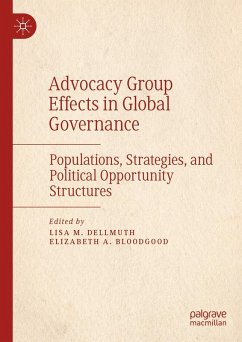Since the end of the cold war, advocacy groups have proliferated and enjoyed increasing access to global governance institutions such as the European Union, Marine Stewardship Council, United Nations, and to partnerships between such institutions. This book seeks to push theories of interest groups and international non-governmental organizations forward. It argues that the advocacy group effects on global governance institutions are best understood by examining how groups use and shape domestic and global political opportunity structures. It examines how, when, and why domestic and global political opportunity structures shape advocacy group effects in global governance, across global institutions, levels of government, advocacy organizations, issue areas, and over time. As special interests are becoming increasingly involved in global governance, we need to better understand how advocacy organizations may impact global public goods provision.
Dieser Download kann aus rechtlichen Gründen nur mit Rechnungsadresse in A, B, BG, CY, CZ, D, DK, EW, E, FIN, F, GR, HR, H, IRL, I, LT, L, LR, M, NL, PL, P, R, S, SLO, SK ausgeliefert werden.









